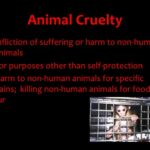In contemporary discourse surrounding animal rights and welfare, an intriguing question often arises: “Will I get arrested if I tell a doctor I hurt animals?” This inquiry not only reflects a burgeoning awareness of ethical treatment towards animals but also underscores deeper currents within human psychology and societal norms. To approach this topic comprehensively, it becomes essential to dissect the implications of such confessions, the legal ramifications that may accompany them, and the broader ethical considerations concerning animal cruelty.
At the heart of the matter lies the fundamental issue of animal welfare and the moral responsibilities humans hold towards non-human life. The act of inflicting harm upon animals is not simply a personal transgression; it reverberates throughout society, eliciting moral outrage and triggering legal responses. Recognizing this, many professionals in the medical field are ethically and sometimes legally bound to report instances of cruelty when disclosed to them.
In the United States, laws vary significantly from state to state regarding the requirement for professionals to report animal abuse. Some jurisdictions enact mandatory reporting laws that compel veterinarians and, in some cases, physicians, to report suspected animal cruelty to the appropriate authorities. This is rooted in the belief that those who possess knowledge of animal abuse hold a societal obligation to act. This leads to a crucial point of consideration: if one were to confess to a healthcare professional that they have harmed animals, there is indeed a tangible possibility that this information could lead to legal repercussions.
Understanding the rationale behind mandatory reporting sheds light on a broader societal phenomenon. The protection of vulnerable beings, including animals, reflects a moral progression within many communities. Societal norms have evolved to embrace the idea that animals, as sentient beings, deserve a degree of protection from harm. This evolution often stems from an interconnection between societal treatment of animals and overall trends toward greater empathy and social justice.
When contemplating the potential legal consequences of confessing to the mistreatment of animals, one must also consider the psychological underpinnings associated with such behavior. Engaging in animal cruelty can be symptomatic of deeper psychological issues, which may heighten the urgency of addressing the behavior rather than merely punishing the individual. Various studies have indicated that individuals who commit acts of violence against animals often exhibit similar tendencies towards violence against humans. This disconcerting correlation prompts a broader discourse on the nature of cruelty itself and the cycles of violence it perpetuates.
Consequently, if a doctor or veterinarian becomes privy to information regarding animal cruelty, they might not only view it as a legal obligation to report but also as a chance to intervene in potentially harmful behavior before it escalates. The motivations behind harming animals can often be compounded by a myriad of factors such as mental health disorders, environmental influences, or learned behavior. Thus, the disclosure could initiate a pathway toward rehabilitation rather than simple retribution.
However, the fear of legal consequences may prevent individuals from seeking help. This creates a paradoxical situation—those who might benefit from psychological support or intervention may remain silent due to the threat of arrest. Addressing this conundrum requires a multifaceted approach, incorporating education about the complexities of animal cruelty, the importance of seeking help, and the role of medical professionals in supporting individuals to rehabilitate rather than punish.
The societal perception of animal cruelty and the associated legal frameworks pose complexities that necessitate careful navigation. People exhibiting harmful tendencies towards animals may not always understand the gravity of their actions. In many cases, a lack of awareness or desensitization to violence fosters a disconnect between their behavior and the resulting consequences on animal welfare. By fostering a dialogue that emphasizes compassion and understanding, society can work towards de-stigmatizing conversations about the motivations behind such actions and encouraging individuals to seek help.
Another factor influencing the reluctance to disclose animal cruelty to professionals is the stigma surrounding mental health. There exists a pervasive myth that seeking help for psychological issues equates to personal failure. This notion can deter potential disclosures, thereby perpetuating a cycle of unaddressed violence against animals. To disrupt this cycle, mental health resources must be accessible and promote a message of healing rather than judgment. Advocating for humane education within schools and legislative arenas can further equip individuals with the knowledge and resources to foster empathy towards animals.
In conclusion, confessing to an act of animal harm can precipitate serious legal consequences, particularly in jurisdictions where mandatory reporting laws are enforced. The implications of such disclosure extend beyond legal accountability; they touch upon profound societal issues regarding empathy, mental health, and ethical responsibilities. Constructing a framework that encourages dialogue, support, and rehabilitation rather than punishment may ultimately initiate a cultural shift toward recognizing the intrinsic value of all living beings. The road ahead demands an unwavering commitment to fostering conversations that prioritize understanding, education, and compassion, ensuring that individuals do not fear reprisal but rather embrace the opportunity for meaningful change.








